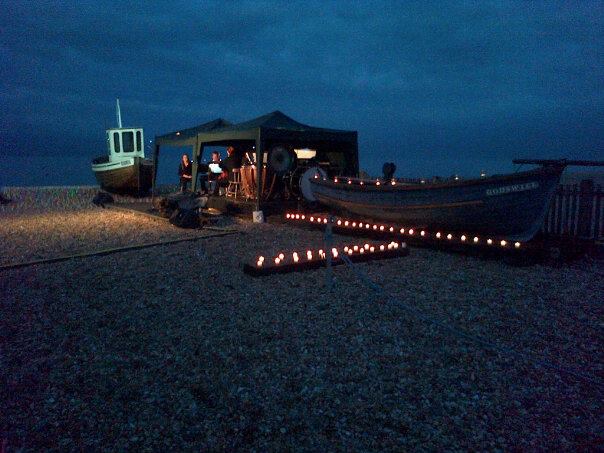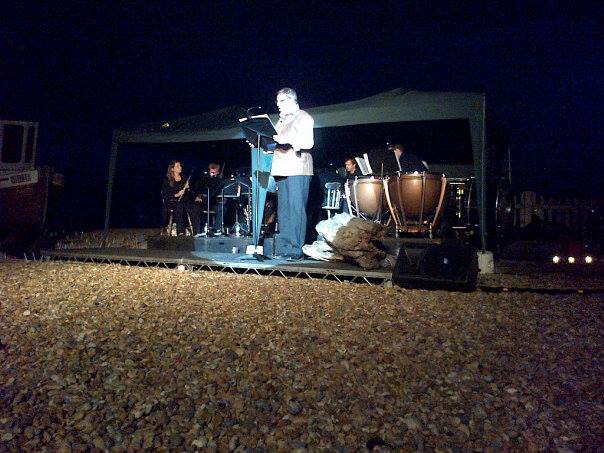The strange behaviour of neighbours leads to an unforgettable evening of music at the Deal Festival for postgraduate student and soprano, Hannah Perrin.
—-
This was entirely by accident. I bumped into my upstairs neighbours on the driveway and wondered where they were heading out to at twenty to ten at night. With the explanation, and having sung Britten earlier this year with the University Cecilian Choir, I thought it would be interesting to hear a different presentation of his work, so along I went, notebook in hand, to (as it turned out) Britten on the Beach.
At 9.45pm it was half-dark, with the lights of the pier visible from the beach and the shops along the Strand lit up, the chip shop doing a very brisk trade! We walked along the prom to be directed onto the beach between two of the fishing huts, with the instruction “keep the glow sticks to your right”. The scene was amazing – lit by a “sea” of multicoloured glow sticks and storm lanterns were two traditional wooden fishing boats, either side of a smallish open-sided shelter for the musicians, and a large, sun-bleached tree trunk acting as a seat. In the semi-darkness, the effect was very atmospheric.

Spilling out of the sides of the shelter were Chroma, a chamber ensemble based in London and known for their dynamic performances of contemporary works. This evening’s septet included a large percussion section along with flute/piccolo, violin, oboe, cello, horn and harp (kudos to whoever lugged everything across the shingle). They warmed up as the audience arrived crunchily across the beach, exclaiming over the set and asking “is this patch of pebbles taken?”, and making conversation with their neighbours in the way that the English doing something unusual with strangers tend to do. The more seasoned festival-goers had brought folding chairs, but I was quite happy sitting by the front. One of the most noticeable things was the smell – an evocative mixture of beach, sea, and the faint waft of barbecue from further up the beach.
The music began with a solo flute, joined by the violin in a melancholy, sea shanty-like introduction. The narrator came to sit on his tree trunk and read from Crabbe’s poem The Borough, on which Britten’s Peter Grimes was based. Verses were interspersed with sections of the sea interludes from the opera, brilliantly dissonant crashing waves from the strings and percussion, screeching gulls and sea spray on the cymbals, the harp depicting shimmering sunlight on calm water. The poetry moved to a piece written by a local author telling the story of a shipwreck and rescue on the Goodwin Sands, interspersed with a haunting tenor solo from Mark LeBrocq.

The music continued to embody the changing emotions of the sea – beautiful swelling scales starting in the cello and going all the way to the top of a very agile piccolo and back depicting receding waves, and ominously long notes from the cello and horn foretelling bad news from the rescue effort as the narrator told of “horrors in the night”. As the story developed, the crew did actually return over the crest of the beach with flaming torches, along with the young apprentice, the old skipper and the cynical mate. It was a very effective use of few actors to tell a very evocative tale – the sights and smells of the beach itself along with Britten’s brilliant evocations of the sea in all its moods combining into an unforgettable evening.
Text and images: Hannah Perrin.
Hannah is a PhD student in the School of Social Policy, Sociology and Social Research at the University of Kent. Follow Hannah on Twitter.

